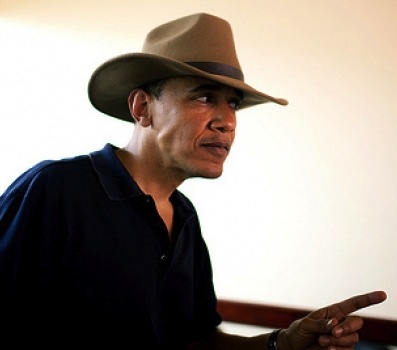In a new piece at Foreign Policy, Ammar Abdulhamid meticulously describes how fundamentally disparate, disorganized, and divided are the Syrian rebels. He writes that although they all want the overthrow of Assad, there is no unified goal as to what ought to come after the regime and no demonstrated support for democratic reforms. Amazingly, his conclusion is still that the US not only needs to arm these rebels and promote certain elements of them, but that we may need to take military action as well.
 Abdulhamid’s bio reveals that he is an an adjunct fellow at the Foundation for Defense of Democracies, the post-9/11 Washington think tank that focuses on policy ideas that work to overthrow Middle Eastern governments of a particular kind – the kind that are not propped up by the United States. The FDD is filled with neoconservatives like Bill Kristol, Joseph Lieberman, Newt Gingrich, Charles Krauthammer, Michael Ledeen, etc. They were in the forefront of advocating for the Iraq war and are manifestly supportive of a war on Iran. So, while Abdulhamid has traveled to the Turkish border to talk with members of the Syrian opposition, his policy advice should be viewed with the utmost skepticism.
Abdulhamid’s bio reveals that he is an an adjunct fellow at the Foundation for Defense of Democracies, the post-9/11 Washington think tank that focuses on policy ideas that work to overthrow Middle Eastern governments of a particular kind – the kind that are not propped up by the United States. The FDD is filled with neoconservatives like Bill Kristol, Joseph Lieberman, Newt Gingrich, Charles Krauthammer, Michael Ledeen, etc. They were in the forefront of advocating for the Iraq war and are manifestly supportive of a war on Iran. So, while Abdulhamid has traveled to the Turkish border to talk with members of the Syrian opposition, his policy advice should be viewed with the utmost skepticism.
Abdulhamid describes how there is no structured leadership in Syria’s rebel opposition, and that there is indeed often internal conflict among them. There are no secularists. There are Salafists, committed Islamists, and ordinary folk who’ve taken up arms. There are thousands of “foreign fighters” – “mostly from Gulf states, Libya, Tunisia, Chechnya, Somalia, and Sudan.” One element conspicuously missing from his analysis is any emphasis on the growing al-Qaeda presence in Syria’s rebel fighters. Even other establishment analysts who support US intervention, like those from the RAND Corp., grant that “a rebel victory could result in Al Qaeda or its sympathizers coming to power in a post-Assad Syria.”
Nevertheless, Abdulhamid’s description of the opposition fighters tends to validate one of the central mainstream arguments against using them as a proxy force to overthrow Assad; they are disorganized. Yet, he still advocates providing certain elements of the opposition, which the know-it-alls in Washington will determine are better than the others, “with the tools needed to topple the Assad regime” and to help “build a new, inclusive political order.”
It’s an incredible conclusion to make after specifying how unreliable these rebel groups are and how few of them, if any, actually want an “inclusive political order.” First, the advice disregards (at least explicitly) what has been true throughout the history of US-funded proxy militias: the US is not interested in democracy in Syria. What is wanted is a new, exclusive client state that is approximately as democratic as the rest of the dictatorships the US props up around the region.
Furthermore, the same groups he advocates should receive more US funding are also being funded, armed, and influenced by Saudi Arabia, Qatar, Kuwait, and other such countries. These are not exactly bastions of freedom and democracy. And consider the hubris of once again allying with Saudi Arabia to fund a far-off guerrilla group as the US once did in Afghanistan in the 1980s with the mujihadeen. That adventure didn’t turn out so well, did it?
 Washington is already sending money and equipment to the rebels, despite the fact that the United Nations says they’ve committed war crimes and despite the growing presence of al-Qaeda. Additional US meddling would undoubtedly worsen conditions on the ground and deepen the civil war. As Prof. Eva Bellin and Prof. Peter Krause in the Middle East Brief from Brandeis University found in their study of the Syria situation: “The distillation of historical experience with civil war and insurgency, along with a sober reckoning of conditions on the ground in Syria, make clear that limited intervention of this sort will not serve the moral impulse that animates it. To the contrary, it is more likely to amplify the harm that it seeks to eliminate by prolonging a hurting stalemate.”
Washington is already sending money and equipment to the rebels, despite the fact that the United Nations says they’ve committed war crimes and despite the growing presence of al-Qaeda. Additional US meddling would undoubtedly worsen conditions on the ground and deepen the civil war. As Prof. Eva Bellin and Prof. Peter Krause in the Middle East Brief from Brandeis University found in their study of the Syria situation: “The distillation of historical experience with civil war and insurgency, along with a sober reckoning of conditions on the ground in Syria, make clear that limited intervention of this sort will not serve the moral impulse that animates it. To the contrary, it is more likely to amplify the harm that it seeks to eliminate by prolonging a hurting stalemate.”
Abdulhamid also advocates some kind of US military action against the Assad regime: “Without creating military parity on the ground, including neutralizing Assad’s air power, a political solution will be impossible. And without a political process that involves both rebels and militias, any effort will fail. Military means alone will not be sufficient to help any side prevail.”
Half-measures like so-called safe zones are not a viable option. “Humanitarian corridors,” explained Marc Lynch of George Washington University in testimony before a House Foreign Affairs subcommittee, ”would be extremely difficult to protect, and could create a new refugee crisis if desperate civilians rush into designated safe zones or neighboring countries.”
Safe areas might also require airpower in some form, but Assad’s “anti-aircraft capabilities are located in or near urban areas, which means that significant civilian casualties could result from any attempt to eliminate them.” Lynch said. ”Creating and protecting a safe area in Syria would therefore require a significant and lengthy investment of troops and resources, and would not likely hasten Assad’s collapse.”
Finally, where in the world the United States gets the moral and legal authority to choose sides in Syria’s civil war is not mentioned by Abdulhamid. Beyond that, we’d be asking the same knuckleheads who can’t balance a budget to pull the strings and mastermind an end to a very complex conflict that may very well expand into a regional war with additional US meddling.
